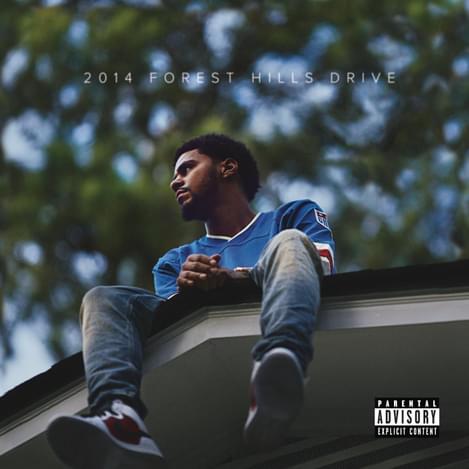J. Cole - 2014 Forest Hills Drive
"2014 Forest Hills Drive"

There was a time when it felt definition was indeed Cole’s ambition: his previous LP, 2013’s bold Born Sinner was riddled with tracks that suggested an untapped reserve of lyrical deftness and a canny ear for a great beat: it was one of the strongest rap albums of the year (and lest we forget, 2013 was the year that brought us game-changers like Yeezus and Nothing Was the Same) and spoke of growth and promise that left his fans awaiting new work with baited breath. Unfortunately for them, 2014 Forest Hills Drive doesn’t suggest an artist who’s continued on his predicted trajectory, but rather one who has allowed himself to become overwhelmed by the feast of creatively diverse emergent rap the last two years have endowed us with, and consequently no longer really knows where he’s headed.
As an album it feels listless, slapdash and even at times lazy, as though the hunger and frustration that seemed to creep out of the corners of Born Sinner has dissipated, with too many of the songs appearing like the embittered ghosts of other (not always better) rappers’ oeuvres: the preposterously titled “A Tale of 2 Citiez” could be a Drake off-cut, the sample from “Fire Squad” languishes like something out of a second-class Eminem track and the beat on “Hello” might as well have been a Flying Lotus rip-off, while “St Tropez” sees Cole attempting to sing in a manner previously only heard in the more excruciatingly awkward works of Childish Gambino.
The problem with all of this is it renders Cole’s claims to greatness hollow, his confidence ringing untrue, echoing throughout the album as though he himself knows he isn’t really fooling anyone. His use of lame tropes about hos and bitches also fall short, an accessory to a point about nothing at all, much like his infrequent references to racial tensions in the music industry (yes, there’s a dig Iggy Azealea’s, albeit one so mild as to barely register), which feel, in comparison to the forceful entreaty for change presented by the likes of Run the Jewels and Kendrick Lamar, like a beginner’s guide to hopping on an idealistic bandwagon: the easy way to feign depth.
If this all sounds overly negative, it’s not meant to – these low points somehow manage not to detract from the glimmers of his previous brilliance, and Cole’s charm is almost certainly to thank for this. Despite using a chorus that plays off the overworked ‘windows/walls’ chant made famous by the Ying Yang twins, album standout “G.O.M.D” reminds us that, stylistic confusion aside, Cole can spit.
Over a chopped up vocal sample and alien beats he finally shows us the flow that earned him his reputation as one of the best in the game, with the kind of callous fury that fans will cling to as a sign his passion hasn’t died. It’s a similar emotional investment to that which crops up in “Wet Dreams”, a feat of storytelling and a moment of honesty so grand as to be cringe worthy, recounting the tale of young Cole’s sexual awakening, and the fumbling naivety which defined it. It’s a sweet moment, and a flash of self-deprecation that arises rarely in Hip Hop, a genre so often coloured by its obsession with self-aggrandisement.
Cole’s humanity is undoubtedly one of his most endearing traits, and it runs like a heady wave throughout Forest Hills Drive. It is indeed this humanity which makes it easy to forgive the faults in what could, and should, have been a classic album, the unified vision of a man at the top of his game, and certain of his place in an ever shifting landscape. In the end it is a work crippled by its own indecision, and perhaps bowed by the weight of expectation: a shame, for sure, but hardly a reason to lose faith. It may be that our hopes for Cole were too high, but there remains enough of worth in his latest endeavour to assure us that his is a talent worth holding out for.
Get the Best Fit take on the week in music direct to your inbox every Friday

Lorde
Virgin

OSKA
Refined Believer

Tropical F*ck Storm
Fairyland Codex





